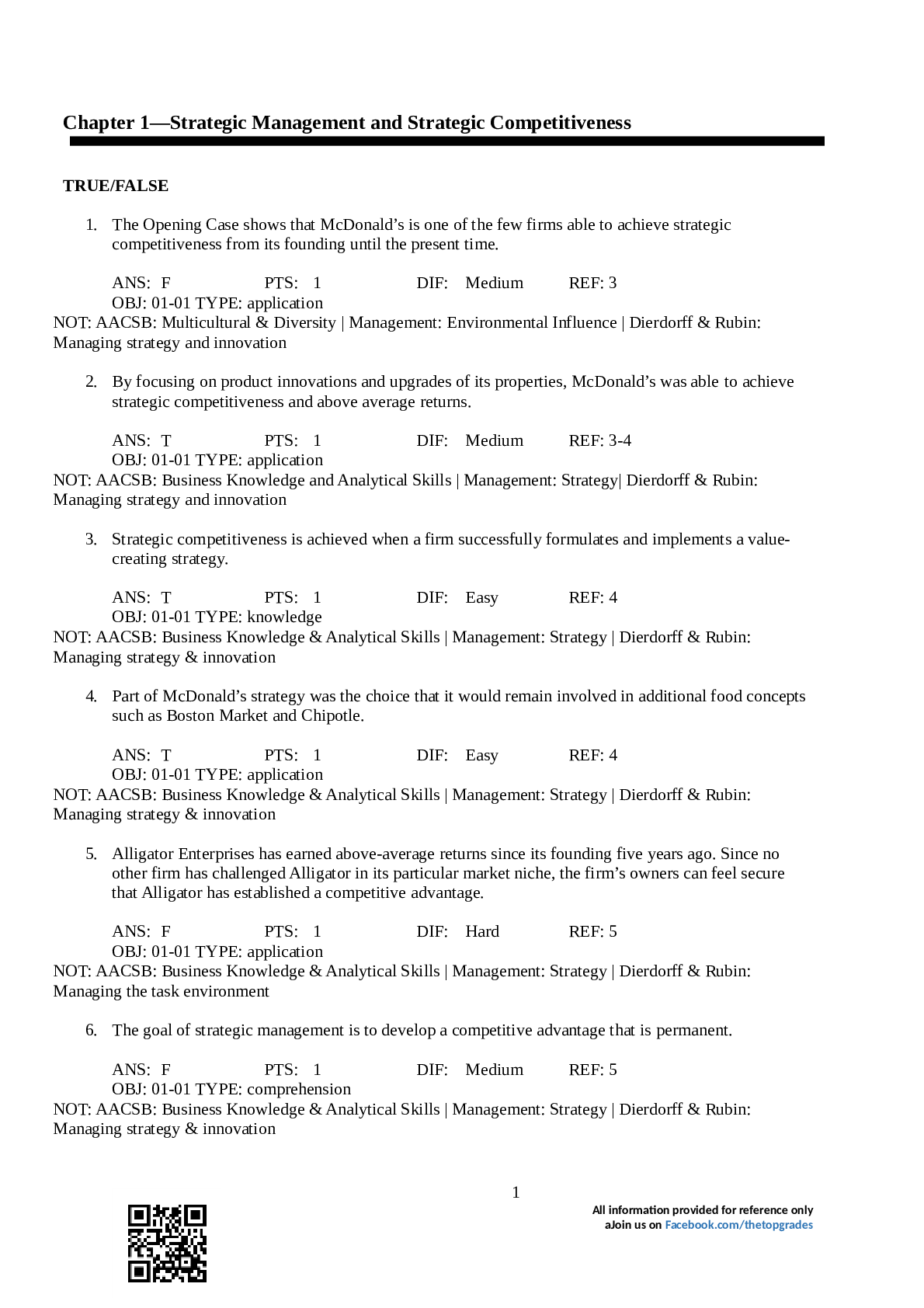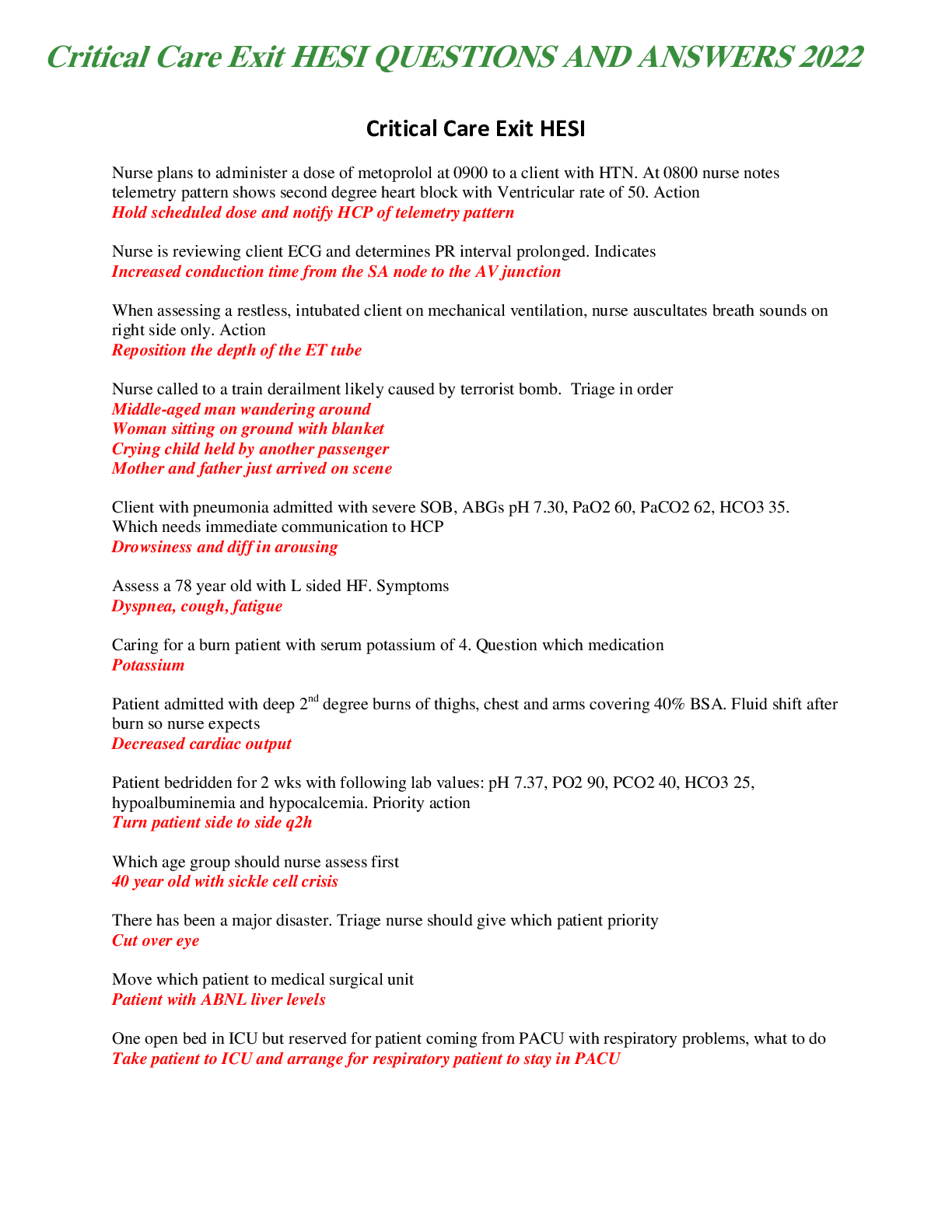*NURSING > EXAM > VARCAROLIS: CHAPTER 12 - SCHIZOPHRENIA AND SCHIZOPHRENIA SPECTRUM DISORDERS QUESTIONS AND ANSWERS 2 (All)
VARCAROLIS: CHAPTER 12 - SCHIZOPHRENIA AND SCHIZOPHRENIA SPECTRUM DISORDERS QUESTIONS AND ANSWERS 2022 LATEST
Document Content and Description Below
VARCAROLIS: CHAPTER 12 - SCHIZOPHRENIA AND SCHIZOPHRENIA SPECTRUM DISORDERS QUESTIONS AND ANSWERS 2022 LATEST 1. A person has had difficulty keeping a job because of arguing with co-workers and a... ccusing them of conspiracy. Today the person shouts, "They're all plotting to destroy me. Isn't that true?" Select the nurse's most therapeutic response. a. "Everyone here is trying to help you. No one wants to harm you." b. "Feeling that people want to destroy you must be very frightening." c. "That is not true. People here are trying to help you if you will let them." d. "Staff members are health care professionals who are qualified to help you." - ANS: B Resist focusing on content; instead, focus on the feelings the patient is expressing. This strategy prevents arguing about the reality of delusional beliefs. Such arguments increase patient anxiety and the tenacity with which the patient holds to the delusion. The other options focus on content and provide opportunity for argument. PTS: 1 DIF: Cognitive Level: Apply (Application) REF: Page 205-206 | Page 213-215 (Box 12-4) A newly admitted patient diagnosed with schizophrenia is hypervigilant and constantly scans the environment. The patient states, "I saw two doctors talking in the hall. They were plotting to kill me." The nurse may correctly assess this behavior as: a. echolalia. b. an idea of reference. c. a delusion of infidelity. d. an auditory hallucination. - ANS: B Ideas of reference are misinterpretations of the verbalizations or actions of others that give special personal meanings to these behaviors; for example, when seeing two people talking, the individual assumes they are talking about him or her. The other terms do not correspond with the scenario. PTS: 1 DIF: Cognitive Level: Understand (Comprehension) REF: Page 206 (Table 12-1) TOP: Nursing Process: Assessment MSC: Client Needs: Psychosocial Integrity 3. A patient diagnosed with schizophrenia says, "My co-workers are out to get me. I also saw two doctors plotting to kill me." How does this patient perceive the environment? a. Disorganized b. Dangerous c. Supportive d. Bizarre - ANS: B The patient sees the world as hostile and dangerous. This assessment is important because the nurse can be more effective by using empathy to respond to the patient. Data are not present to support any of the other options. PTS: 1 DIF: Cognitive Level: Understand (Comprehension) REF: Page 210 (Table 12-3) | Page 213 (Box 12-4) 4. When a patient diagnosed with schizophrenia was discharged 6 months ago, haloperidol (Haldol) was prescribed. The patient now says, "I stopped taking those pills. They made me feel like a robot." What are common side effects the nurse should validate with the patient? a. Sedation and muscle stiffness b. Sweating, nausea, and diarrhea c. Mild fever, sore throat, and skin rash d. Headache, watery eyes, and runny nose - ANS: A Typical antipsychotic drugs often produce sedation and extrapyramidal side effects such as stiffness and gait disturbance, effects the patient might describe as making him or her feel like a "robot." The side effects mentioned in the other options are usually not associated with typical antipsychotic therapy or would not have the effect described by the patient. PTS: 1 DIF: Cognitive Level: Apply (Application) REF: Page 215-216 (Table 12-4) TOP: Nursing Process: Assessment MSC: Client Needs: Physiological Integrity 5. Which hallucination necessitates the nurse to implement safety measures? The patient says, a. "I hear angels playing harps." b. "The voices say everyone is trying to kill me." c. "My dead father tells me I am a good person." d."The voices talk only at night when I'm trying to sleep." - ANS: B The correct response indicates the patient is experiencing paranoia. Paranoia often leads to fearfulness, and the patient may attempt to strike out at others to protect self. The distracters are comforting hallucinations or do not indicate paranoia. PTS: 1 DIF: Cognitive Level: Analyze (Analysis) REF: Page 207 | Page 212-213 TOP: Nursing Process: Planning MSC: Client Needs: Psychosocial Integrity 6. A patient's care plan includes monitoring for auditory hallucinations. Which assessment findings suggest the patient may be hallucinating? a. Detachment and overconfidence b. Darting eyes, tilted head, mumbling to self c. Euphoric mood, hyperactivity, distractibility d. Foot tapping and repeatedly writing the same phrase - ANS: B Clues to hallucinations include eyes looking around the room as though to find the speaker, tilting the head to one side as though listening intently, and grimacing, mumbling, or talking aloud as though responding conversationally to someone. PTS: 1 DIF: Cognitive Level: Understand (Comprehension) REF: Page 206-207 | Page 212-213 TOP: Nursing Process: Assessment MSC: Client Needs: Psychosocial Integrity 7. A health care provider considers which antipsychotic medication to prescribe for a patient diagnosed with schizophrenia who has auditory hallucinations and poor social function. The patient is also overweight and hypertensive. Which drug should the nurse advocate? a. Clozapine (Clozaril) b. Ziprasidone (Geodon) c. Olanzapine (Zyprexa) d. Aripiprazole (Abilify) - ANS: D Aripiprazole is a third-generation atypical antipsychotic effective against both positive and negative symptoms of schizophrenia. It causes little or no weight gain and no increase in glucose, high- or low-density lipoprotein cholesterol, or triglycerides, making it a reasonable choice for a patient with obesity or heart disease. Clozapine may produce agranulocytosis, making it a poor choice as a first-line agent. Ziprasidone may prolong the QT interval, making it a poor choice for a patient with cardiac disease. Olanzapine fosters weight gain. PTS: 1 DIF: Cognitive Level: Analyze (Analysis) REF: Page 215-219 (Table 12-5) TOP: Nursing Process: Planning 8. A patient diagnosed with schizophrenia tells the nurse, "I eat skiller. Tend to end. Easter. It blows away. Get it?" Select the nurse's best response. a. "Nothing you are saying is clear." b. "Your thoughts are very disconnected." c. "Try to organize your thoughts and then tell me again." d. "I am having difficulty understanding what you are saying." - ANS: D When a patient's speech is loosely associated, confused, and disorganized, pretending to understand is useless. The nurse should tell the patient that he or she is having difficulty understanding what the patient is saying. If a theme is discernible, ask the patient to talk about the theme. The incorrect options tend to place blame for the poor communication with the patient. The correct response places the difficulty with the nurse rather than being accusatory. See relationship to audience response question. PTS: 1 DIF: Cognitive Level: Apply (Application) REF: Page 205 | Page 213-214 TOP: Nursing Process: Implementation MSC: Client Needs: Psychosocial Integrity 9. A patient diagnosed with schizophrenia exhibits little spontaneous movement and demonstrates waxy flexibility. Which patient needs are of priority importance? a. Self-esteem b. Psychosocial c. Physiological d. Self-actualization - ANS: C Physiological needs must be met to preserve life. A patient with waxy flexibility must be fed by hand or tube, toileted, given range-of-motion exercises, and so forth to preserve physiological integrity. Higher level needs are of lesser concern. PTS: 1 DIF: Cognitive Level: Apply (Application) REF: Page 207 | Page 209-210 TOP: Nursing Process: Planning MSC: Client Needs: Physiological Integrity 10. A patient diagnosed with schizophrenia demonstrates little spontaneous movement and has waxy flexibility. The patient's activities of daily living are severely compromised. An appropriate outcome would be that the patient will: a. demonstrate increased interest in the environment by the end of week 1. b. perform self-care activities with coaching by the end of day 3. c. gradually take the initiative for self-care by the end of week 2. d. accept tube feeding without objection by day 2. - ANS: B Outcomes related to self-care deficit nursing diagnoses should deal with increasing ability to perform self-care tasks independently, such as feeding, bathing, dressing, and toileting. Performing the tasks with coaching by nursing staff denotes improvement over the complete inability to perform the tasks. The incorrect options are not directly related to self-care activities, difficult to measure, and unrelated to maintenance of nutrition. PTS: 1 DIF: Cognitive Level: Apply (Application) REF: Page 209-210 TOP: Nursing Process: Outcomes Identification MSC: Client Needs: Physiological Integrity 11. A nurse observes a catatonic patient standing immobile, facing the wall with one arm extended in a salute. The patient remains immobile in this position for 15 minutes, moving only when the nurse gently lowers the arm. What is the name of this phenomenon? a. Echolalia b. Waxy flexibility c. Depersonalization d. Thought withdrawal - ANS: B Waxy flexibility is the ability to hold distorted postures for extended periods of time, as though the patient were molded in wax. Echolalia is a speech pattern. Depersonalization refers to a feeling state. Thought withdrawal refers to an alteration in thinking. PTS: 1 DIF: Cognitive Level: Understand (Comprehension) REF: Page 207-208 TOP: Nursing Process: Assessment MSC: Client Needs: Psychosocial Integrity CONTINUES... [Show More]
Last updated: 2 years ago
Preview 1 out of 21 pages

Buy this document to get the full access instantly
Instant Download Access after purchase
Buy NowInstant download
We Accept:

Reviews( 0 )
$7.50
Can't find what you want? Try our AI powered Search
Document information
Connected school, study & course
About the document
Uploaded On
Sep 26, 2022
Number of pages
21
Written in
Additional information
This document has been written for:
Uploaded
Sep 26, 2022
Downloads
0
Views
51
























